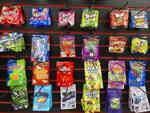JEFFERSON CITY — Missouri senators on Monday debated a crackdown on hemp-derived cannabis sales at gas stations and smoke shops, a proposal that has placed the state’s convenience stores and legal cannabis industry at odds.
Representatives of the state’s strictly regulated legal marijuana industry are pushing for legislation that would limit sales of hemp-derived products to state-licensed dispensaries. The hemp products were made permissible by the 2018 federal farm bill.
Missouri state Sen. Nick Schroer, R-Defiance.
Opponents argue the Missouri proposal, by Sen. Nick Schroer, R-Defiance, unfairly advantages the legal marijuana industry. But Schroer cast his plan as a way to protect public health and safety, pointing out that St. Louis-area minors had been sickened after ingesting cannabinoids.
On March 14, six elementary school students in the Riverview Gardens School District were sent home after eating Delta-8 Nerds Rope Bites and Mad Monkey Sour Strawberry Premium Gummies, the Post-Dispatch previously reported.
Schroer said since the 2018 farm bill, “hemp-derived products including delta-8 have flooded the market with little-to-no oversight,” he said. “This lack of regulation has created a dangerous loophole allowing children, teenagers easy access.”
Unlike sales of cannabis in state-licensed dispensaries, hemp-derived delta-8 products currently for sale at Missouri gas stations are unregulated by the state Department of Health and Senior Services. There are also no specialty taxes on the delta-8 products or official age restrictions.
However, industries that developed after the 2018 farm bill fear that the proposed Missouri legislation would extinguish their businesses by giving regulatory power to the state health department, which has imposed strict limitations on the issuance of marijuana licenses. Currently, there are fewer than 220 dispensaries allowed to operate statewide.
“What you’re saying is we need to shut down all of the businesses that are currently selling this product, and making revenue from this product,” said Sen. Karla May, D-St. Louis.
May proposed an amendment to Schroer’s plan that would allow sales at convenience stores and elsewhere so long as sellers limit sales to buyers 21 and older and that products comply with state packaging and testing requirements.
But Schroer said May’s amendment amounted to the “honor system” and eventually the Senate adjourned for the night without agreement on the marijuana bill.
The House is considering its own plan to place delta-8 regulation under the DHSS umbrella, but the House Crime Prevention and Public Safety Committee has not voted on the legislation since taking it up in February.
The legislation is Senate Bill 984.





While marijuana and hemp are the same plant (cannabis) federal law makes a distinction between marijuana, which is grown for high THC content, and hemp, defined by its low content. But since congress passed the 2018 farm bill authorizing the growing of hemp nationwide, there’s been an unforeseen consequence. People exploiting what they see as a loophole in the law have taken hemp, extracted a non-intoxicating compound called CBD and chemically altered it into various types of impairing THC. Chemically derived THC has wound up in candies, vape oils and other products sold in gas stations, convenience stores and online. At least 17 states have banned such products in the past year. Regulators in Michigan are considering rules that would allow processors to convert CBD into THC with written prior approval. They also would have to label their product as synthetic.
Be the first to know
Get local news delivered to your inbox!
